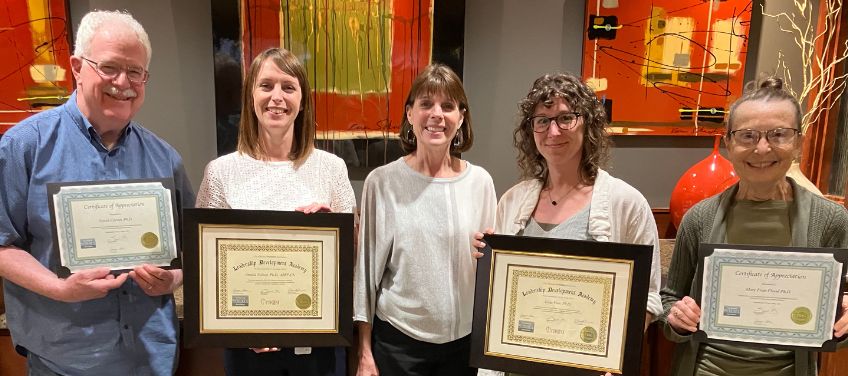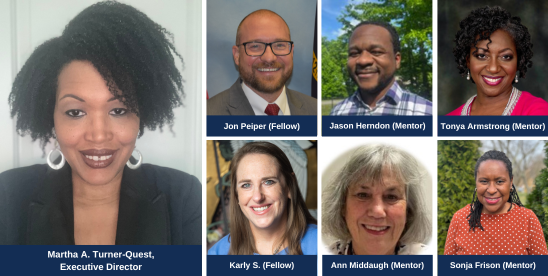Background and Introduction
Introductory Video
Purpose of The Trust LDA Toolkit
Why Establish An LDA?
Purpose of the LDA
Resources Needed to Establish an LDA
Components of An Effective LDA: The Basic Steps to Set Up Your LDA
Components of An Effective LDA: Core Program Elements
Self-Assessment for Readiness
The Trust Pilot LDA Programs
Other Resources
About The Toolkit--Authors
Table of Contents: Toolkit Resources

BACKGROUND AND INTRODUCTION
Welcome to The Trust Leadership Development Academy Toolkit! This toolkit was designed to respond to some urgent needs of State, Provincial, and Territorial Associations (SPTAs) in a changing marketplace. Diminishing financial resources have resulted in a detrimental impact especially on smaller psychological associations with traditionally limited resources. SPTAs are hard pressed to initiate new programs and services requiring fiscal resources. This toolkit provides SPTAs with key information and resources needed to launch a leadership development academy of their own—determining program goals and rationale, how to assess readiness, defining basic program elements, identifying key program leaders and mentors, creating program marketing strategies, identifying, and selecting program Fellows, putting together program content and program schedules, celebrating, and evaluating program outcomes.
The Trust has long been a strong supporter of state associations. We believe in the importance of strong state associations for our policyholders and the profession. We also believe that supporting SPTAs, supports our policyholders, and that partnering with SPTAs allows for the most benefit for all of us.
The Trust has provided support to SPTAs in a number of ways, especially through our Endorsement program program through which we have 49 SPTAs endorsing The Trust. We’ve always been interested in knowing other ways we can help state associations, and in 2018 established The Trust SPTA Advisory Council. The main focus of The Trust SPTA Council is to brainstorm on ways to enhance the mutually beneficial relationship between The Trust and SPTAs organizationally and financially.
In response to concerns about developing new leadership in SPTAs, The Trust SPTA Advisory Council proposed a pilot program to assist SPTAs, particularly the smaller SPTAs, in the development of their leadership pathways. The pilot program, modeled on the Ohio Psychological Association (OPA) Leadership Development Academy (LDA), assisted in the development of the LDA which was designed to help associations build future leadership capability and encourage future engagement in professional, association, and state issues affecting psychology and psychologists. Three SPTAs, North Carolina, Nebraska, and Mississippi Psychological Associations, engaged in the pilot testing of the Toolkit and shared their experiences and suggestions which have been incorporated into the Toolkit.
The Trust SPTA Advisory Council includes Carmen Skare, Executive Director, Nebraska; Ray Folen, Ph.D., Executive Director, Hawaii; Martha Turner-Quest, Executive Director, North Carolina; Dustin McKee, Executive Director, Ohio; and LaDarion Ammons, Executive Director, Mississippi; and was created and led by Jana N. Martin, Ph.D., CEO of The Trust from December 2010 to March 2024. Two inaugural members of the Council who were integrally involved in the development of the LDA Toolkit were Michael Ranney, former Executive Director, Ohio; and Amy Wilson, former Executive Director, Mississippi.
The Ohio Psychological Association, an active member of The Trust SPTA Advisory Council, has developed a successful ongoing leadership development program, designed to build a pathway of leaders for state leadership. There is a 9-year track record of positive outcomes and lessons learned about key challenges to create both a successful and sustainable leadership development program for SPTAs. We hope that, with support and some custom modification, less-resourced associations could create and implement their own versions of leadership academies designed to identify, develop, and engage future association leaders. Michael Ranney, Dr. Peg Mosher, and Dr. Sandy Shullman, three founding members of the OPA Leadership Development Academy. were brought on as consultants and asked by The Trust to develop and deliver a pilot leadership development program process adapted for the needs of smaller, less resourced SPTAs. This work was completed in 2023.
INTRODUCTORY VIDEO
We are pleased you are interested in The Trust SPTA Leadership Development Academy (LDA) Toolkit! As you will see, there are a number of resources provided in the Toolkit to help you determine if now is a good time for you to consider an LDA for your SPTA, how to plan your LDA, how to recruit and prepare Mentors and Fellows, and what you will need to create a meaningful and successful LDA which fits your SPTA’s needs. We’ve even included templates and videos on leadership to support your efforts.
The Trust SPTA LDA Toolkit, modeled after the Ohio Psychological Association LDA, was pilot-tested by three state associations—Nebraska, North Carolina, and Mississippi—and their experiences and suggestions guided the finalization of the Toolkit.
We wanted to share with you those experiences and suggestions so we created this introductory video in which SPTA Executive Directors and Mentors talk with two of our consultants about how their association has benefited from the Trust LDA Toolkit, what they found most valuable, how they overcame obstacles, and what they would do differently in their next LDA—and they are all planning their next LDA!
Our consultants, Drs. Shullman and Mosher, posed 7 questions to our participants. Below is a description of each question and discussion. You may watch the video in its entirety, or you may use the descriptions to guide you to specific questions of interest. We hope you find this conversation helpful and motivating! We wish you a successful Leadership Development Academy journey!
Introduction and Question 1: What went really well in your Leadership Development Academy (LDA) Pilot Program?
Panel members discussed the importance of flexibility throughout the planning and running of their LDA. Some shared how pleased they were that they chose a small number of Fellows for their first LDA which allowed them to focus on tailoring the program to fit the needs of their SPTA and their Mentors and Fellows. All talked about the value of requiring Fellows to join Committees and to design and complete LDA projects, both of which allowed for cohesiveness and engagement. Panel members also all agreed that the outcome of having all Fellows become active in leadership roles and remain active after the program was completed reflected the success of the program and the best outcome of their efforts.
Question 2: What were some of the significant obstacles you faced?
Deciding on the number of Mentors and Fellows and the time and effort to recruit them; identifying and communicating the benefits of the program to engage participants; finding training and other resources which best fit the needs and skills for Mentors and Fellows; and funding to provide in-person experiences, were reviewed as potential obstacles. Panelists, however, described how they were able to re-frame and resolve several obstacles by using many and varied resources in the Toolkit, using virtual meetings, and being flexible and determined.
Question 3: What have you learned through this process?
This discussion covered the importance of insight into psychologists’ professional responsibility as members of their SPTAs and to their colleagues; the importance of intentionally cultivating and supporting others in development of leadership skills and how such benefits all; how exciting it is to see others discover their own strengths; how providing an LDA is a risk but worth taking due to the experiences and outcomes; and how many participants viewed their participation as one of the most rewarding experiences they’ve had.
Question 4: When you do your next LDA, what will you do differently based on your experience?
All panelists agreed about the importance of marketing the LDA and its benefits, impact, and success. Several ideas of how to market it differently were shared. Building and perpetuating LDA efforts leads to more success and a sense of commitment and of ownership of leadership development as all learn from each other. Participants also discussed the value and importance of Mentorship.
Question 5: What was the role of the Executive Director in the LDA?
Executive Directors serve a very valuable role in LDA Programs in supporting a shift in culture, creating processes, recruitment, oversight, facilitating, motivating, and encouraging all involved. Having a strong SPTA leader to work with the Executive Director is critical. All shared how helpful the Toolkit was with template forms, leadership material and resources, and more, so that each SPTA could start with a good foundation and roadmap instead of starting from “scratch”. Also, the toolkit provides a framework and resources which assist Executive Directors and SPTAs to avoid having to adjust to a program which may not be the best fit for them.
Question 6: What was the value of the Fellows’ projects in the LDA and what advice would you give regarding including projects in the LDA?
All panelists agreed that the Fellows’ projects were very valuable and should be included. They emphasized the importance of ensuring the projects both benefit the SPTA and are of interest to the Fellow. Either individual Fellow projects or group projects are beneficial and rewarding, and decisions about which to choose depend on the needs and interests of Mentors and Fellows in each LDA.
Question 7: What words of encouragement and guidance would you share with other SPTAs who are considering a Leadership Development Academy Program?
Comments included, “You can do it!” “It’s doable even if it looks daunting.” High praise was given to the Toolkit and for the process and outcome, and all participants are planning their next LDA. Those considering an LDA are encouraged “not to let the perfect be the enemy of the good”. The consultants briefly described several components/resources available in the Toolkit.
PURPOSE OF THE TRUST LDA TOOLKIT
This toolkit is designed to provide detailed information, probing questions, specific strategies, and suggested resources so that you can create and customize a successful Leadership Development Academy (LDA) for your SPTA. We recognize that each SPTA brings its own unique context, history, focus and challenges. The toolkit is presented to provide a range of options from which you can design a leadership development academy that meets the unique needs of your SPTA. You may want to create an LDA with a few or many of the options offered.
WHY ESTABLISH AN LDA?
Attracting effective leaders in our current rapidly changing environment is increasingly difficult, especially for under-resourced, not-for-profit, organizations like professional associations. Leaders are needed who can address increasing ambiguity and complexity. Many people are reluctant to volunteer to lead but want to learn to do so. Some may lack the time, resources, confidence, or skills necessary to mobilize colleagues and resources to achieve organizational goals. Some people have been historically left out of leadership opportunities and do not see themselves as part of the leadership of their traditional professional groups.
Learning to be an effective leader or envisioning how you could contribute as a leader in your profession or discipline beyond your daily work often takes some collective attention and effort by others. Individuals can learn some specific leadership skills on their own, but research over the past forty-five years (Center for Creative Leadership—see McCauley, 2010; 2013) has shown clearly that effective leadership is best learned by a combination of immersion experiences, positive mentoring, modeling and support, and targeted formal group learning experiences in addition to individual skill development.
Leadership development programs (academies) provide a systematic way to develop skills, prepare people for specific leadership roles, and create the necessary support and confidence for a successful leadership experience for a broader range of people. Developing an LDA for your SPTA can help develop and nurture an active pathway of future and emerging leaders, which reflects the broad diversity of psychologists in your geography. In doing so, consider the following questions:
1. Why are you interested in developing an LDA for your SPTA?
As noted, SPTAs all have their own issues and challenges to address. The demographics of your state, territory or province may well affect the makeup of your professional association. SPTAs also vary in the general interests of their psychologist population. It is important to figure out and anticipate where you might want to build up your organization’s leadership and what might be of interest to potential participants. You may decide there is neither sufficient need nor interest to develop an LDA. Or you might find out by a little exploration that there is more interest in developing leadership in your SPTA than you realized.
2. What outcomes are you anticipating and/or hoping for?
An LDA cannot solve all of an SPTAs leadership needs, but it can serve as a foundational part of a strategy to attract, engage, develop and support SPTA leadership and involvement. First, it can create a structure and system to attract and engage diverse psychologists and/or psychologists at various career stages to leadership opportunities within your SPTA. Second, it can help create an avenue for the development of leadership skills that members can transfer from your SPTA to other work and professional settings. Third, it can help create useful professional networks and/or ongoing mentoring and coaching opportunities which can strengthen relationships and provide career-long professional and leadership development within your SPTA. Fourth, it can provide a gateway to broader advocacy involvement, both within your SPTA and in coalition with other organizations. These are just a few of the most frequent outcomes sought by SPTAs initiating leadership development academies.
PURPOSE OF THE LDA
An LDA can be created for several reasons, depending on your SPTAs goals and focus. You may want to bring in members who are earlier in their careers or possibly still in graduate programs. You may want to encourage mid-career members to take on SPTA leadership responsibilities. You may even want to help your senior and/or Board leadership work more effectively together. Your LDA can help your participant leaders do the following:
- Develop a deeper understanding of individual leadership styles.
- Enhance leadership effectiveness in a professional association, with special emphasis on your SPTA.
- Expand engagement, experience, and effectiveness with your SPTA leaders and members or specific subgroups or committees.
- Enhance personal and interpersonal leadership styles.
- Learn about significant challenges in your SPTA.

RESOURCES NEEDED TO ESTABLISH AN LDA
A leadership development academy (LDA) is more than a series of presentations, lectures, or even skill-building sessions. It is an integrated, systematic program over time, providing leadership learning opportunities through group interaction, mentoring, immersion experiences and individual learning opportunities. This means that your SPTA needs to collectively support, financially and otherwise, a dedicated learning effort because many of your existing leaders may well be part of the Academy program. It may take several iterations to attract and retain the broader, more diverse group of leaders you may need for the future. Also, creating a longer-term leadership pathway for your SPTA likely would involve a repeatable LDA program so that leaders continue to help develop themselves as well as future leadership in an ongoing way over several years. So, this raises some key questions for your SPTA to consider:
1. Is there a commitment from your SPTA leaders?
A leadership development program requires a sustained commitment of SPTA leadership. This involves the following:
• commitment to and clarity of the broad goals of the program.
• leaving space and time to integrate leadership development activities and Fellows into a number of SPTA functions.
• willingness to potentially participate as a mentor, presenter, supporter, etc.
2. Can you identify those staff and members who will be involved in developing and supporting your LDA?
An LDA does require some dedicated effort by several of your Association staff and leaders. Experience tells us that you need point people to take the lead on program content, administrative logistics, and mentoring. This can be one or multiple people who take charge of these areas. An LDA Committee can also greatly help support these efforts.
3. How will you financially support your LDA? (e.g., food, lodging, meeting space)? Materials (testing, inventories, articles)? Consultants (if needed)?
An LDA does require some financial support from your SPTA. Implementing significant program portions virtually can substantially reduce fiscal costs for lodging, food, and meeting space. There may be events, however, that you might find better done in person. Program materials will vary in cost, depending on what you choose to use. Outside speakers and consultants can require substantial resources. Many of these resources can be found or donated within your SPTA. It is helpful to bring in the person or persons who are involved with your association’s finances at the beginning so you can track expenses for future planning.
We have included resources in this toolkit, such as written materials, videos, and templates designed to be customized and adapted by you to fit your SPTAs needs. A number of these resources can help to keep your financial costs manageable. Many of these resources can also save you time by not having to “reinvent the wheel.”
Beyond what is here, The Trust, APA and other SPTAs may have additional resources and initiatives that may work well with the goals of your SPTAs LDA. For example, you might want to consider working together with other SPTAs to identify virtual speakers who can present to several SPTA groups at once, especially on broader leadership topics not specific to any one SPTA. You could also think about running your LDA at the same time as other SPTAs to support each other. Three of The Trust’s pilot LDA groups found it helpful to support each other as they were implementing their initial LDA programs. Also, you may find it extremely helpful to scan locally for resources. Your local communities may also have leadership development resources and efforts underway that you could utilize.

COMPONENTS OF AN EFFECTIVE LDA: THE BASIC STEPS TO SET UP YOUR LDA
Develop the LDA Leadership Structure
The basic foundation of a successful LDA is ongoing SPTA leadership. Typically, this will include an LDA Coordinator and an LDA Committee that will develop and oversee the LDA program. The sequence of identifying an LDA Coordinator and selecting an LDA Committee can vary among the SPTAs. For example, if there is an individual who has been an ardent supporter of the LDA and possesses leadership skills, then, perhaps, they may be an ideal choice to be the LDA Coordinator. On the other hand, if there are several people who are committed to and enthusiastic about the LDA, you may decide to establish an LDA Committee first. Then the Committee can identify or elect the LDA Coordinator. A third option may be to share the coordination of specific components of the LDA, (e.g., Fellows Coordinator, Mentoring Coordinator, Retreat Coordinator, etc.). Remember: there is no one single way to organize your LDA. Do what’s best for your LDA and SPTA!
Form an LDA Committee
Once your SPTA has agreed to support an LDA, the next step will involve establishing an LDA Committee. The members of this Committee will be responsible for proposing the focus, content, implementation, and evaluation of the LDA. The members of this committee should represent the diversity of your SPTA membership, including leadership experience, cultural background, membership status (e.g., ECP, mid-career, later-career, retired, other), and interest in and commitment to leadership development. We also recommend that administrative staff who will be involved with the LDA be included. To maximize the efficiency of the committee, we recommend a committee no larger than 3-6 members, depending on the size of your SPTA and the needs of the LDA.
Identify an LDA Coordinator
Once the LDA Committee has been established, you will need to identify an LDA Coordinator. (Note: For a variety of reasons, your SPTA might start by identifying an LDA Coordinator first and then building an LDA Committee.) This person should be an SPTA leader who is supportive of developing an LDA and knowledgeable about program development in general and leadership development in particular. In some cases, the LDA Coordinator may be the Executive Director (ED), Chief Executive Officer (CEO), or a senior staff person. In any case, this person may be appointed by the SPTA leadership or elected by the LDA Committee.
The LDA Coordinator will be responsible for overseeing the development of the LDA, collaborating with the LDA Committee, and communicating with the SPTA leadership on progress, events, and needs (e.g., Board of Directors, Executive Committee). We have provided a detailed sample of LDA Coordinator responsibilities. Click here to download the LDA Coordinator Responsibilities.
The first task of the LDA Committee and LDA Coordinator will be to identify components of an ideal LDA. This task will help you prioritize what you want to include and the duration of the LDA you will need. The potential components of an LDA are covered in detail later in this document.
Organizational Home of the LDA
A fundamental tenet of developing an LDA is to ensure program stability over time. Of course, this depends on your goals for your LDA. If, for example, you are trying to build a leadership pathway or truly attract and retain a broader diversity of psychologists in SPTA leadership, you might want to consider a longer-term view of your LDA and its potential impact over time.
Although there are no guarantees of LDA program stability, our experience and recommendations are focused on creating a system that will increase the likelihood of the LDA enduring into the future. From our experience, we recommend that the LDA become a Standing Committee—a permanent or standing structure that will continue in some form across time, Faculty and participants. For example, when the COVID pandemic occurred, OPA decided to cancel its LDA in-person and halt the original program as planned. Instead of suspending all work, the LDA planning group decided to offer leadership development in the form of a Zoom webinar series, which was extremely well received. And, because there was an ongoing OPA LDA planning group, the LDA continued with its program in a revised program format the following year. Also, continuity in the program over time strengthens opportunities for new people to get engaged with both the program and the larger organization.
Another reason that program stability is important is that it is more likely that the LDA can find or continue to develop resources for program sustainability. Many seasoned SPTA members find great satisfaction and enjoyment in mentoring and are quite willing to continue to mentor more junior members. With a dedicated budget line and/or source of revenue, the LDA can enhance its program and evolve over time to meet changing leadership needs. A fund can be created for donations to such an ongoing initiative, as witnessed by several successful ongoing leadership development programs in psychology organizations. The program can also expand, given time, to serve other organizational needs. For example, the Ohio LDA is now also involved in helping the OPA Board of Directors focus on its own leadership as the new Board forms each year.
In essence, an LDA can serve as the foundation for significant leadership development throughout the SPTA over time if it has the time and stability to grow as an organizational resource rather than just being seen as a single program.
Determine LDA Schedule
You’ll need to refer to your work on your LDA Committee to identify components that are most important, somewhat important, or less important to your LDA. This will help you determine your priorities and the duration of your LDA. You may want to develop a schedule for an LDA that will last 6, 9, and 12 months to assist in your decision-making.
We have included a sample LDA schedule for your review. This sample is a schedule from the second OPA LDA (2016-2017). It includes a brief description of previous leadership development work in OPA and the subsequent emergence of the LDA. Also, please note that the LDA schedule includes attendance requirements, which are helpful in establishing program expectations for Fellows. It also includes an application format for that program. Click here to download the Sample LDA Schedule.
Also, if you are thinking about a repeated LDA program to establish a longer-term ongoing program, you might want to consider doing the actual program every other year, or you can find yourself coordinating two overlapping programs at once! You may also find it hard to recruit a full group of LDA Fellows every year.
Determine the LDA Time Frame
The time frame of your LDA can vary considerably, depending on several important variables. The amount and type of LDA content generated by the LDA Committee will be significant in determining the appropriate duration of the LDA. For example, if the LDA content includes networking with other groups or advocacy with state and local leaders, more time will be needed to coordinate. If the LDA content is focused more on ongoing skill and leadership development, the LDA timeframe may be shorter. In addition to LDA content, the availability of administrative staff, committee members and Mentors who will be involved with the LDA may also affect the timeframe of the LDA. You will also need to be aware of potentially conflicting events and holidays that may interfere with your LDA schedule. Typical LDA durations are 6, 9, or 12 months. For your first LDA, you may want to consider developing an LDA of shorter duration. For example, the OPA Pilot LDA was comprised of four sessions. OPA selected this option to evaluate LDA content and feedback from Fellows, Mentors and Administrators. This allowed OPA to determine any adjustments needed to move forward. Click here to download the OPA LDA 4 Session Model. OPA learned that there are many moving parts of an LDA, which can feel overwhelming, especially in the beginning. Give yourself a break by starting off smaller!
Marketing/Advertising the LDA
Advertising the LDA can begin once you have agreed to develop an LDA, formed an LDA Committee and identified an LDA Coordinator. This sequence is important so that LDA announcements come from the same source to avoid any possible confusion coming from multiple sources. You may start promoting “an exciting new opportunity for members interested in leadership development. More detailed information to follow.” As your LDA develops, subsequent announcements should be made, approximately every few weeks or perhaps monthly. The goal is to pique the interest of SPTA members. Advertising should come in multiple modes, including mass emails/texts to members, SPTA publications, announcements, meetings, and professional development programs. If you have an in-person or hybrid convention, you may want to create an LDA poster board with sign-up sheets for members to receive more information. Make sure to follow up on every inquiry!
Approximately two months before the start of the LDA, send out applications. We have provided sample marketing material and a sample LDA application format. Click here to access the Sample Marketing Material. Click here to download the LDA Application.
We have also included a sample Marketing LDA Sign-Up document that can be used at conferences, conventions, or larger group meetings. Click here to download the OPA Marketing LDA Sign-Up sheet.
Recruitment: Fellows, Mentors, Presenters
Marketing and advertising the LDA are an important recruitment tool for Fellows, but it can also help in the engagement of Mentors and presenters.
Fellows
By this point, the LDA Committee will likely have determined whether the LDA is seeking ECP Fellows, mid-career, later career, retired or other LDA candidates. Committee members may discuss possible Fellow candidates with the committee, other colleagues, committee chairs and other SPTA leaders. Make sure these names will be or already have been sent applications.
Note: You may be inclined to focus your LDA on graduate students. While this can be beneficial if these students plan to stay in your geographic area, many graduate students accept internships out of state and may not return to their graduate school state. An important goal of LDA is to develop a pathway for Fellows to move into your SPTA leadership. So, if you’re considering accepting a graduate student into your LDA, a discussion is warranted.
Mentors: Identifying potential Mentors is as important as identifying Fellows. Recruiting as many potential Mentors as possible will allow you to have more options to make the best pairing between each Fellow and Mentor. Key characteristics of Mentors include knowledge of and experience in your SPTA, willingness to share relevant professional experiences, proficiency in active listening, commitment to help develop future leaders, and an ability to invest the time needed to effectively mentor a Fellow. Approximate time commitment: 1-3 hours per month.
Presenters: Presenters/instructors are central to the leadership content of your LDA. They can present various “Issues in Leadership” at the opening retreat and as part of the Fellows’ monthly meeting. Presenters may also be Mentors, SPTA leaders or outside leaders or consultants.

COMPONENTS OF AN EFFECTIVE LDA: CORE PROGRAM ELEMENTS
OPENING RETREAT
An initial retreat to formally kick off your LDA program is a great way to get started. In addition to covering some initially important content and getting everyone clear about program expectations, an opening retreat can help build important relationships among Fellows, Mentors and Fellows, and among the larger LDA community, including faculty, SPTA leaders, administrators, and staff. As OPA, for example, has done a number of retreats over the past nine years, the retreats have actually evolved. In the first year, OPA held a one-day in-person retreat with Fellows and presenters in attendance. In subsequent years, there was a two-day, in-person retreat with Fellows, Mentors, and presenters. Then came the Covid pandemic. OPA decided to cancel an in-person LDA, which was typically held in the Fall, hoping for an end to the pandemic so that the LDA could be scheduled for the following Spring. When this failed to occur, OPA then decided to present a webinar series, "How to Lead and Navigate in Tumultuous Times," open to all OPA members. Click here to download the OPA Leadership Development Webinars. We have provided a description of this series, a part of the overall “Issues in Leadership.” Click here to download Issues in Leadership.
We’re sharing this as a reminder that factors may interfere with your best-laid plans. Your LDA Committee and Coordinator need to be prepared for unexpected events and situations. If you create and maintain collaborative relationships with SPTA leaders and other colleagues, you’ll be more likely to effectively work through unanticipated problems, such as schedule conflicts or resource needs.
In planning a Retreat, you’ll need to determine the following:
When: When do you want your LDA to begin? When will it conclude? Will it be a 6-, 9-, or 12-month LDA? What are potential conflicts during these time periods that you may want to avoid?
Where: Where would you like to have the retreat? SPTA office space? Outdoor retreat space (e.g., in a park)? Community space (e.g., university or public Library)? Other university, college, or public spaces? Factors to consider: Cost? Availability on which days? Will you need a kitchenette with a refrigerator for meals, drinks, and snacks?
Who: Who will be involved? Fellows, Mentors, presenters, LDA Coordinators, LDA Committee members, SPTA leaders, and others? The decisions of who to include in the retreat will likely have an impact on the format of the retreat.
Format: Are you planning an in-person, virtual, or hybrid retreat? Consider the advantages and disadvantages of each format. An in-person retreat fosters more interpersonal interaction with other Fellows, Mentors and LDA facilitators, develops cohort cohesion more quickly and often promotes richer dialog. In OPA’s experience, the biggest disadvantage is the distance some Fellows, Mentors and instructors need to travel to attend the retreat. This can result in a specific city/geographic-centric retreat/LDA. Other disadvantages: Cost of food, lodging for Fellows/Mentors, facilitators and instructors who travel to the retreat.
If you are considering having at least one in-person event, research would indicate that the kick-off retreat might have the most impact on group and community formation.
Content: The contents of your retreat should reflect the purpose and goals of your LDA. We have provided two sample retreat agendas, one for a virtual retreat. Click here to download Sample Virtual Retreat Agenda and one for an in-person retreat Click here to download Sample In-Person Retreat Agenda.
PLEASE NOTE: If you are taping the retreat (or any portion), remember to get permission from all attendees.
The Sample Agenda in Box 1 and the previous sample agendas are based on a typical OPA LDA two-day retreat. This may assist you in considering topics and content you want to include in your retreat. If you choose a one-day retreat, you may consider providing only one leadership presentation. If your Fellows have taken inventories (e.g., FIRO-B), you could review those results in a Fellows meeting. Make sure you have an instructor who is knowledgeable about the purpose, interpretation, and applicability of the inventory. Click here for more information on the use of assessment tools in your LDA. You will likely have time to review mentoring, projects, meetings and LDA requirements. One of the most fundamental aspects of a successful LDA of any duration is engagement. You will not want to short-change the welcome, introductions, discussing the presentations, and what was learned at the retreat. We have also included a general tool to promote learning which can be used by Fellows to consolidate their learning from a retreat or any other substantive LDA session. Click here to download Sample Takeaways Worksheet.
SAMPLE RETREAT AGENDA
Day 1
Welcome and Introduction
- Introductions of all attendees, including LDA role (Fellow, Mentor, presenter, others)
- Discussion question(s): e.g., What do you hope to learn from your LDA experience?
- Can you share a particularly positive or negative leadership memory?
- Goals, Purpose, and Mission of the LDA
- Review Retreat Agenda
- Presentation:
- Concepts of Leadership (any topic that serves as an introduction to leadership)
- Discussion
- LUNCH/BREAK
- Presentation: This may be another leadership topic or an experiential exercise about leadership
- Program Guidelines and Expectations
Day 2
Welcome Back
- Follow-up from Day 1: Thoughts, Questions, Ideas
- Presentation: Some Sample Topics
- Leadership in a diverse and multicultural world; learning leadership
- Adaptive leadership, leadership in tumultuous times
- Reviewing self-assessment inventory results (FIRO-B, MBTI, other, if these are a part of your LDA)
- Discussion of presentations from both days: Putting together what you’ve learned about leadership so far
- LUNCH/BREAK
- Mentoring
- Roles and responsibilities
- Matching Mentors and Fellows
- Projects
- Guidelines
- Setting goals
- Issues in Leadership
- Requirements (See previous section with Sample LDA Schedule material)
- Retreat
- Board meetings (2)
- Fellows’ meetings/Issues in Leadership (4)
- Project
MENTORS
An important aspect of learning about leadership comes from developmental social relationships. Many leadership development programs use Mentors, seasoned organizational professionals, to be learning guides for those participating in leadership development programs. Having a Mentor for each of the participants in your leadership development academy can provide an important developmental organizational relationship experience. Mentors can help program Fellows learn about your SPTA organization, the challenges faced and opportunities to contribute, based on interests and skills. Mentors can also help LDA Fellows work through program projects and provide ongoing learning as the program progresses.
In our experience, Mentors also become highly energized (or re-energized) working with program Fellows. They often express a desire to continue as Mentors in subsequent programs. So… the mentoring relationship can easily become a two-way benefit for all participants and the organization. Mentors can also help program Fellows with questions related to their general career and regular work settings. They can be matched with program Fellows to reflect particular expressed career or learning interests. See Mentor Responsibilities Click here to download Mentor-Mentee Expectations.

MEETINGS AND TRAINING SESSIONS
It is important for the LDA to have a consistent structure and set of touchpoints. The following are the types of meetings that can serve that function. The frequency, duration and content of various meetings will be largely determined by the needs of the participants and the focus of your LDA. We recommend that you determine your meeting attendance requirements and the dates of these meetings before your LDA begins so that you can include all the dates in your marketing materials.
Fellows Meetings
The primary purpose of these meetings is to have regular opportunities to discuss the LDA experience to date, share any questions or concerns, update progress with projects, discuss leadership challenges and share observations of Board meetings, other SPTA interactions and/or events. The facilitator of this meeting may be the LDA Coordinator or a member of the LDA Committee. We recommend a monthly meeting. The duration will likely depend on the number of Fellows and will vary from 30 to 60 minutes. We recommend that this be required for a specified number of meetings.
Issues In Leadership
Throughout the duration of the LDA, presentations about leadership can be offered approximately every other month. These “Issues in Leadership” range from “Conflict Management,” “Leading a Meeting,” “Social Justice and Leadership,” “Imposter Syndrome,” “Leadership Lessons: Self-Awareness,” “Preventing Burnout,” and “Creating a more Diverse Association.” The presenters for Issues in Leadership should have expertise in the content being presented and may be SPTA members/leaders or experts/leaders from your community. Typically, based on our experience, this might be added to the Fellows meeting as a second hour. We recommend that this be required for a specified number of presentations. A list of sample Issues in Leadership topics has been provided. Click here to download Issues in Leadership.
Mentors Meetings
Mentors should meet on a regular basis to discuss their mentoring experience. Other common discussions include feedback from Fellows, dealing with challenging Fellows, reviewing program content, including adjustments that may need to be made. For less experienced Mentors, these meetings may be an opportunity to learn more about mentoring from more seasoned Mentors. The facilitator of this meeting should be someone with mentoring experience. This individual may be a current or previous LDA Mentor, the LDA Coordinator or a member of the LDA Committee. The frequency and duration of this meeting may be determined by the group of Mentors primarily based on mentoring experience and need. We have included resource materials on expectations for both Mentors and Mentees. Click here to download Mentor-Mentee Expectations. We have also provided a sample of profiles of desired mentor characteristics, preferences and expertise, as described by a group of Fellows in an LDA program. Hopefully, this may give you some ideas about how to identify and select Mentors for the Fellows in your program. Click here to download Sample Mentor Preferences, Characteristics and Expertise.
LDA Committee Meetings
The LDA Committee is responsible for developing and overseeing all aspects of the LDA. While a great deal of the LDA Committee’s work is done in planning prior to the beginning of the LDA, you may want to meet as a Committee during the LDA to discuss ongoing programming, general progress to date, evaluation issues, and what you are learning about doing an LDA. Remember that there are many moving parts within an LDA. You’ll need the time and resources (human, technical, and financial) to create a successful LDA and perhaps evolve it as a sustainable program. Click here to download Project Worksheet & Sample Projects.
FELLOWS PROJECTS
In many leadership development programs, Fellows are asked to complete a project to successfully graduate from the LDA. Projects provide an opportunity for Fellows to learn more about the organization and how things get done. It is also an opportunity for them to make a concrete contribution to your SPTA and to work with others to implement an initiative. Fellows are encouraged to collaborate with their Mentors to develop their projects. Based on experience with several SPTA LDA’s, we recommend that the project have relevance to your SPTA in a beneficial way so that other members have investment in the work. Projects may be designed to be an individual or group effort. Projects can be presented in some capacity to the SPTA, so that they can be both recognized and integrated into other efforts. Project format may include an article or report, a presentation at convention or another venue, a toolkit on an SPTA need, a workshop or program design of interest to SPTA members, or an assessment/data analysis related to an important topic for your SPTA, to name a few.
We have included a sample of project guidelines and goal setting, based on our experience, to help Fellows understand and work through project parameters and a sample worksheet that may help Fellows lay out their project thinking. Click here to download Project Guidelines and Goal Setting Worksheet. We have also included a sample project agreement which helps to define and formalize a commitment to complete the work. Click here to download Sample Final Project Agreement. This is clearly a place where interaction with Mentors can be very helpful, and these tools can help Fellows and Mentors work together to make the projects relevant and meaningful for all. Finally, we have included a link to sample projects, based on the OPA LDA experience over time. When you connect with the link, scroll down to the bottom of the page and select from Fellow’s project descriptions by year. Click here to download Sample Projects.

LDA EVALUATIONS
A robust program evaluation process can be an exceptionally helpful and critical component of a successful LDA program. We would suggest you administer evaluations from all members of your LDA community: Fellows, Mentors, instructors, administrators, LDA Coordinators, and LDA Committee members, dependent on your LDA configuration. This will help you identify and understand how the LDA has been perceived from multiple perspectives and help identify any adjustments you may want to make.
You also may want to administer pre- and post-evaluations to Fellows. This can provide some insights into the impact of your LDA on the leadership development of the Fellows. We have included a sample evaluation, which was used to evaluate The Trust LDA Pilot Programs. Click here for The Trust LDA Pilot Evaluation. Of course, your evaluation strategy will be dependent on the goals and focus of your LDA program. Click here to view the NPA LDA Fellows Evaluation, and click here to view the NPA LDA Mentors Evaluation.
Finally, we have provided the questions and results for an early OPA LDA evaluation study of the inaugural LDA program (2016). This evaluation work was the LDA project of one of the first OPA LDA Fellows, who worked with OPA administrative staff to format the evaluation so that it could easily be distributed via Survey Monkey. Click here to download the OPA 2016 Evaluation Project.
SELF-STUDY/ASSESSMENT: ARE YOU READY TO DEVELOP AN LDA?
As part of The Trust’s LDA Pilot Program, we interviewed each of the potential pilot SPTAs to determine their focus and general readiness to initiate an LDA program. Based on those interviews, we developed a self-study tool, which may be of help to you in assessing and thinking through your own needs and readiness to initiate an LDA program for your SPTA. Click here to download the LDA Self-Study Assessment for Readiness.
 Nebraska LDA: David Carver (Mentor), Aimi Nelson (Fellow), Carmen Skare, Executive Director, Gina Furr (Fellow), and Mary Fran Flood (Mentor) (left to right)
Nebraska LDA: David Carver (Mentor), Aimi Nelson (Fellow), Carmen Skare, Executive Director, Gina Furr (Fellow), and Mary Fran Flood (Mentor) (left to right)
TRUST PILOT LDA PROGRAMS 2023 (OVERVIEW)
As part of the development of this toolkit, The Trust engaged with four SPTAs as pilot sites to develop their LDA programs. While meeting together initially, it was clear very early in the process that each group had its own unique focus, goals, resources, needs and timeframe. Therefore, they needed to customize both their program design and their planning process to create their LDAs. Each SPTA was given an LDA Consultant through The Trust to help them design and implement their inaugural LDAs. Three of the four pilot SPTAs completed their inaugural programs. One postponed its initial LDA program, given general readiness at the time of the pilot process.
Below is a brief summary of each of the completed LDA programs. For each program, we are providing a link to materials they developed that could be shared with other SPTAs.
Nebraska Psychological Association: The Nebraska Psychological Association conducted its LDA from September 2022 to May 2023. Academy leadership was shared by the Executive Director and a senior member of the Board of Directors. Their program selected two Fellows and involved a kickoff retreat meeting, follow-up meetings, leadership topical meetings, ongoing mentoring, and individual NPA-focused projects. The two projects focused on 1) invigorating an Academic Affairs Committee and 2) creating a Brown Bag series for members. The NPA LDA Graduation was held in conjunction with the NPA Annual Spring meeting so that there was ample opportunity for the Fellows to present, interact and be recognized by the full NPA leadership. A set of materials for this pilot has been provided as an additional resource. Click here to view the NPA LDA Materials. This material includes documents addressing participation requirements, slides describing the program, project slides, graduation materials and post program evaluations for both Mentors and Fellows. The Nebraska program included David Carver, Ph.D., and Mary Fran Flood, Ph.D., as Mentors; Carmen Skare, Executive Director, as administrative Coordinator; and Aimi Nelson, Ph.D., and Gina Furr, Ph.D., as NPA’s first LDA Fellows. Presenters included Lori Wall, Ph.D. and Sandra Shullman, Ph.D.
Mississippi Psychological Association: The Mississippi Psychological Association (MPA) launched its pilot LDA with the selection of three Fellows and three Mentors. The MPA LDA included an initial in-person retreat, monthly Mentor meetings, LDA group meetings, leadership seminars, and an LDA project. The LDA project became a group project designed to better understand how/why psychologists in Mississippi choose to join or not join MPA, as well as how MPA can better meet the needs of psychologists in Mississippi. The project entailed gathering the current demographics of MPA members and developing a survey containing questions related to membership, which was sent to all psychologists in Mississippi. The survey data collected was reviewed and findings were reported at the September 2023 MPA Conference with suggestions as to how MPA could use the information to possibly increase membership. At the Conference, there was also a formal LDA graduation ceremony. The MPA LDA Fellows included Brittany Sapp, Ph.D.; Jennifer Ladner-Graham, Ph.D.; and Michael Prazak, Ph.D.; and their respective Mentors were Natalie Gaughf, Ph.D.; Gustave Sison, Ph.D., and Beverly Smallwood, Ph.D. The LDA Steering Committee and Faculty included Amy Wilson as Chair; Kristy McRaney, Ph.D., and Angela Herzog, Ph.D., who also served as Mentor to the Mentors. Click here to download the 2023 MPA LDA Handbook, and click here to download the 2023 MPA LDA Group Project Description.
North Carolina Psychological Association: The North Carolina Psychological Association (NCPA) formally launched its LDA in September 2022 and completed its inaugural program in 2023. Their program selected two Fellows and provided two Mentors to work with the Fellows. Their program involved a kickoff retreat, a series of meetings, ongoing mentoring, focused project work, and a closing capstone event. The NCPA LDA Program included Jon Peiper, Ph.D., and Karly Sokolowski, MA, as Fellows and Ann Middaugh, Ph.D., and Jason Herndon, Ph.D., as Mentors. The NCPA LDA Planning Committee included Tonya Armstrong, Ph.D., Chair; Sonja Frison, Ph.D.; and Martha-Turner Quest, Executive Director. Drs. Jana Martin and Sandra Shullman both participated in the program’s kickoff retreat. Following a most successful inaugural program, NCPA plans to offer the next LDA in 2025. In the interim, NCPA has continued to offer monthly themed meetings throughout 2024, following the Practice and State Leadership Conference (PSLC). Click here to download the NCPA LDA Pilot Retreat Agenda.Click here to download the 2022 NCPA LDA Retreat Agenda.


EVALUATION AND FEEDBACK FROM THE TRUST LDA PILOT PROGRAMS
The Trust LDA Pilot Project included evaluations from the three SPTAs that completed their inaugural LDA program cycle. The general framework for the evaluations focused on five key questions. A summary of the questions and general themes from the pilot groups are below:
1. What went well?
In general, the pilot program's success was helped by having an Executive Director or other person who could handle organizational detail as a focus. Emphasis was placed on setting clear program expectations, having clear program roles, setting expectations for promptness, and having access to the materials from the Ohio LDA. In particular, materials covering program marketing, incorporating mentors, sample meeting agendas, initial program components, and sample evaluations were seen as very helpful. For the pilot groups, having an initial consultation focusing on what an LDA program would look like for each individual LDA was seen as very useful.
2. What were the obstacles?
Clearly, all pilot groups raised the issue of limited financial resources. Some projects may require some financial backing and thus could be limited. Above all, making projects doable is critical. Needed resources like space, presenters and materials might be made available by members. More support to use social media for marketing would be helpful. All of this could help get other SPTA members involved in supporting and sustaining the program as a regular offering.
3. What was learned?
Key learnings included how best to work with Mentors. Selecting Mentors wisely, having someone focus on working with the Mentor group, and giving Mentors some structured expectations, all seemed to add to the effectiveness. Also, some felt it was really helpful to start smaller and be more selective in choosing Fellows to ensure a good fit. Pilots also thought it important to be clear and create an expectation that projects needed to contribute to the SPTA and also be doable by the Fellows within the program timeframe. Regular meetings of groups (Fellows, Mentors, etc.) facilitated accountability. Clearly, a one-size LDA will not fit the needs of each individual SPTA group.
4. In retrospect, what would you do differently?
In general, the pilot groups were very pleased with their final program products. They all would ensure more clear, structured expectations for Mentors, Fellows, and Administrators going forward. More focus would be given to marketing and use of social media. They all felt that, after doing the LDA once, they could do the upfront planning more clearly in the next program iteration.
5. Would you recommend the LDA to other SPTAs?
All three completed pilot programs were clearly viewed as great successes by their SPTAs. While acknowledging that there is a lot of work to do on the front end, the outcomes and visibility of the program were of exceptionally great value. The pilots all reported that their program objectives were met and they were working on how to regularly offer an LDA program, perhaps every two years or so.
OTHER RESOURCES
We have included some other resources to use as you put your LDA together.
The Book List is a list of exceptionally well-known and well-received books about leadership and/or leadership development. All are accessible on Amazon or other book dealers. The list is not exhaustive, but we know that almost every LDA has at least one participant and/or Mentor who likes to learn by reading.
The Selected Articles List is a list of articles and materials that have actually been used in LDA programs. Again, this list is not exhaustive, but several of these articles can be used to help people either prepare for content sessions or for robust discussions about leadership.
LDA Video Resources provides a list of videos we have used or made in a variety of LDA programs and are available for you to use in your program.
ABOUT THE TOOLKIT AUTHORS
This toolkit was created for and funded by The Trust by Ohio Psychological Association LDA leaders Peg Mosher, Michael Ranney and Sandra Shullman. Their biographies and contact information are included as resources, and they can be contacted for additional questions/information.
References:
- McCauley C. (2010). The Center for Creative Leadership Handbook of Leadership Development. Jossey-Bass.
- McCauley, C. (2013). Experience-Driven Leader Development. Wiley.